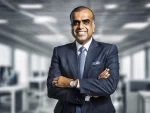He received the Padma Bhushan in 2007, which ranks as India's third-highest civilian honour. He was chosen to serve as the International Chamber of Commerce's chairman on June 15, 2016.
Early life
Sunil Bharti Mittal is a wealthy businessman and philanthropist from India who was born on October 23, 1957.He is the founder and chairman of Bharti Enterprises, which has a variety of holdings in sectors like telecom, insurance, real estate, education, malls, and hospitality. The group's flagship company, Bharti Airtel, is one of the biggest telecom companies in the world and India, operating in 18 nations spanning Asia and Africa and serving more than 399 million customers. Over $14.75 billion in revenue was generated by Bharti Airtel in FY2016. With a projected net worth of $14.8 billion in 2023, Forbes placed him as the tenth-richest Indian.
Sunil Bharti Mittal was born into a Khatri-Agarwal family in Ludhiana, Punjab. His father, Sat Pal Mittal, served as an Indian National Congress member of parliament from Ludhiana, Punjab, serving there for two terms (1976 and 1982) and once (1988) as a nominee. Before attending Scindia School in Gwalior and graduating from Panjab University in Chandigarh in 1976 with a Bachelor of Arts and Science degree for which he attended Arya College in Ludhiana, he originally enrolled at the Wynberg Allen School in Mussoorie. By cardiac arrest, his father passed away in 1992.
Enterprise-Related Activities
Sunil, a first-generation businessman, launched his first company in April 1976 when he was 18 years old with a capital investment of 20,000 rupees (US$250). His initial venture was producing crankshafts for nearby bicycle producers. He founded Bharti Overseas Trading Company in 1980 alongside his brothers Rakesh Mittal and Rajan Mittal, who were import entrepreneurs. He relocated to Mumbai after selling his yarn mills and bicycle components businesses. He bought import permits from exporting firms in Punjab in 1981. Then he brought in thousands of portable electric generators made by Suzuki Motors from Japan. The then-Indian government abruptly outlawed the import of generators.
He began making push-button phones in India in 1984 to replace the cumbersome, outdated rotary phones that were in use at the time. He had previously imported them from a Taiwanese business called Kingtel. A technical partnership between Siemens AG of Germany and Bharti Telecom Limited (BTL) was established for the production of electronic push-button phones. Sunil began producing fax machines, cordless phones, and other telecom equipment in the early 1990s. According to Sunil, the government banned the import of generator sets in 1983. Overnight, my business was shut down. My current activities came to an abrupt halt. I had a problem. What should I do next was the question at hand. Then an opportunity knocked.
In 2013, a special Delhi court summoned Mittal to give testimony over the additional airwaves that were given to specific businesses. Mittal is accused of conspiring with important government telecom officials to illegitimately secure additional spectrum. Although Mittal was not charged, the trial court judge stated that there was sufficient evidence to move forward. By purchasing Warid Congo in late 2013, Mittal made Bharti Airtel the biggest telecom company in the Republic of Congo.
Sunil Mittal made the decision to join the board of Oneweb, a space internet business, public in 2015. In a $500 million investment round that also included Coca-Cola, Virgin, and Qualcomm, Mittal was one of the investors.
Bharti Foundation
Through the Bharti Foundation, the charitable arm of Bharti Enterprises, Mittal has also been promoting education in India. The Foundation has created schools in rural areas around India and provides low-income children with free, high-quality instruction along with free textbooks, uniforms, and midday meals.
The Foundation's main initiative, the Satya Bharti School Programme, operates 254 schools in six States, providing free education to more than 45,000 rural students. Over 350,000 poor children in 11 states are presently served by the Satya Bharti School, Quality Support, and Learning Centre Programmes, among other educational efforts. 'Satya Bharti Abhiyan' (Sanitation) is another programme of the Foundation that has a significant influence on the impoverished groups.
The Bharti Family donated 10% of their fortune (about Rs 70 billion) to philanthropy in 2017 to establish Satya Bharti University, a prestigious university that will provide education to deserving young people from economically disadvantaged groups of society.

